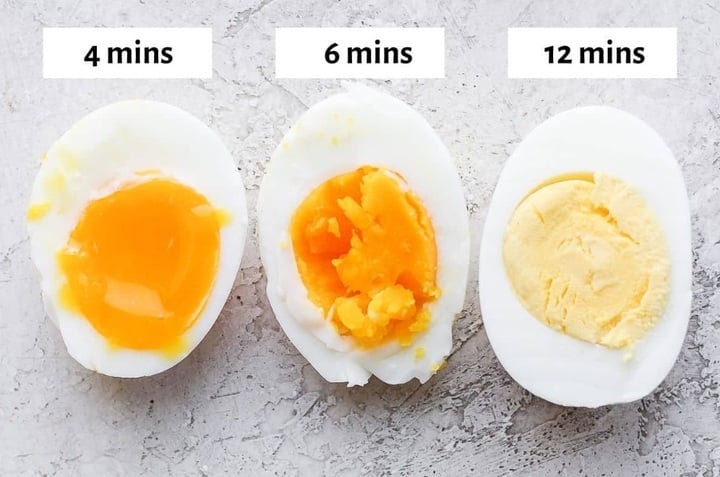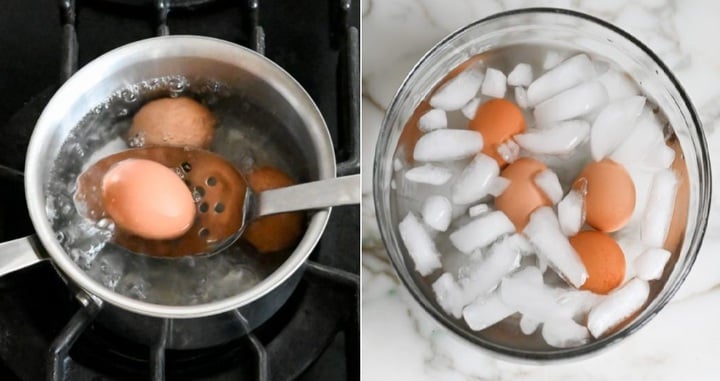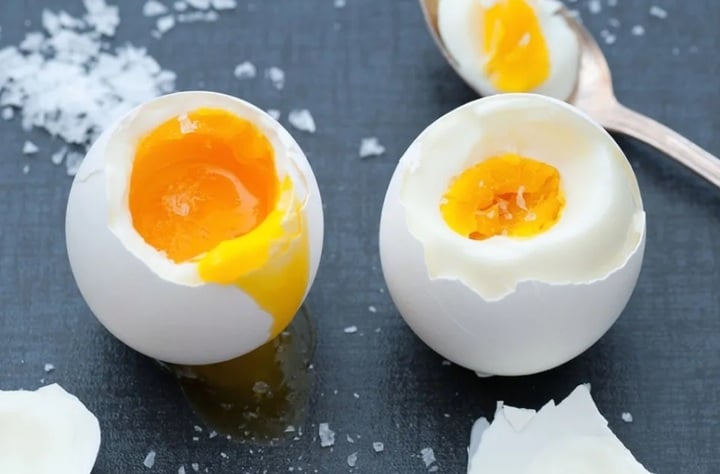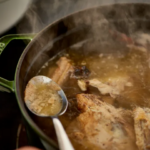Determining the doneness of boiled eggs can be tricky, especially if you’re new to the kitchen. Many dishes require the eggs to remain intact, so you can’t cut them open to check the yolks. So, how can you tell if your eggs are perfectly cooked?
Ways to Know If Your Boiled Eggs Are Done
To avoid the hassle of peeling and cutting open your eggs to check their doneness, try these simple tricks.
 There are multiple ways to tell if your boiled eggs are done without peeling them. (Image source: Pinterest)
There are multiple ways to tell if your boiled eggs are done without peeling them. (Image source: Pinterest)
Calculate Boiling Time
One of the simplest and most effective ways to know if your boiled eggs are done is to time them. For regular chicken and duck eggs, if you prefer a runny yolk, boil them for about 5-7 minutes from the moment the water starts boiling. If you want your eggs fully cooked, boil them for 8-10 minutes.
For balut (duck embryo eggs), the boiling time is longer, usually around 15-20 minutes from the start of boiling, as the embryo inside needs to be thoroughly cooked.
Spin the Egg
Even though timing is helpful, if you forget to keep an eye on the clock, there’s another way to check doneness: spin the egg on a flat surface.
Place the egg on a countertop and give it a gentle spin. If it’s done, the egg will spin quickly and smoothly because the contents inside have solidified, allowing it to maintain its balance. If it’s not done, you’ll notice that it spins slowly and wobbles because the inside is still liquidy, causing it to lose balance.
Submerge in Cold Water
Try submerging the egg in a bowl of cold water. A fully cooked egg will sink to the bottom, while an undercooked egg may float or hover in the middle.
Note that this method works better with regular chicken and duck eggs. For balut, stick to the spinning method for more accurate results.
 Tip for knowing if boiled eggs are done: Submerge them in cold water (Image source: Once upon a chef)
Tip for knowing if boiled eggs are done: Submerge them in cold water (Image source: Once upon a chef)
Give It a Shake
Gently shake the egg and listen for any sounds. This simple trick requires a bit of attention. If the egg is done, you won’t hear any movement inside because the contents have solidified.
On the other hand, if you hear a slight sloshing or liquid-like sound, it indicates that the egg is not fully cooked. While this method may not be entirely accurate, it’s an easy way to get a sense of doneness.
Examine the Shell
By observing and touching the shell, you can easily differentiate between a well-boiled egg and a raw one.
Look at the shell: A boiled egg typically has a shiny and smooth shell, indicating that it has been properly cooked. In contrast, an uncooked egg usually has a dull, slightly rough, or uneven shell.
Touch the shell: When an egg is fully cooked, the shell feels firm and hard to the touch, with no give or softness. If you sense any softness or slight indentation when pressing the shell, it means the egg is not fully cooked.
 Boiled eggs: The whites should be firm, and the yolks should not be runny (Image source: Eat This)
Boiled eggs: The whites should be firm, and the yolks should not be runny (Image source: Eat This)
Tips for Perfectly Boiled Eggs
To achieve the perfect boil, keep the following in mind. Before boiling, let the eggs come to room temperature to prevent cracking when they come into contact with hot water. When the water boils, reduce the heat to a gentle simmer to ensure even cooking and prevent cracking. After boiling, you can soak the eggs in cold water to make peeling easier and to halt the cooking process.
With these tips, you’ll be able to tell if your boiled eggs are done without having to peel each one. This will save you time and ensure your eggs are cooked just the way you like them.
According to VTC News
The Ultimate Guide to a Perfectly Golden Chicken: A Leafy Hack.
In the realm of traditional Vietnamese cuisine, every dish is a precious remedy, and each ingredient is combined with purpose. The humble boiled chicken, a staple in many households, is always accompanied by lime leaves, creating a harmonious blend of flavors that not only delights the taste buds but also offers a plethora of health benefits.






































